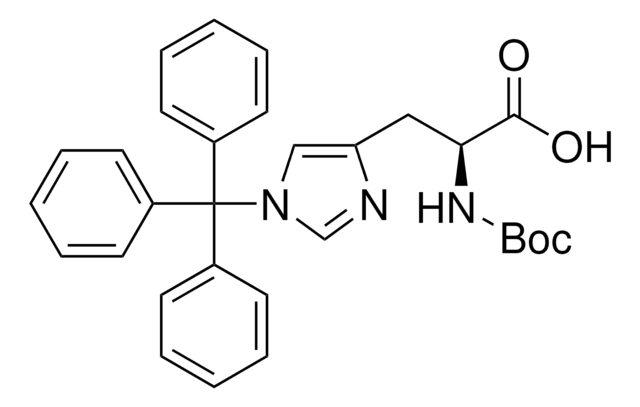P9386
Poly-L-histidine
mol wt 5,000-25,000
Sinónimos:
L-Histidine homopolymer
About This Item
Productos recomendados
form
powder or solid
mol wt
5,000-25,000
color
white to light yellow
application(s)
cell analysis
storage temp.
−20°C
InChI
1S/C6H9N3O2/c7-5(6(10)11)1-4-2-8-3-9-4/h2-3,5H,1,7H2,(H,8,9)(H,10,11)/t5-/m0/s1
InChI key
HNDVDQJCIGZPNO-YFKPBYRVSA-N
¿Está buscando productos similares? Visita Guía de comparación de productos
General description
Application
- as a polycation for the dispersion of multi-wall carbon nanotubes (MWCNTs)
- as a polyionic compound to investigate its ability to rupture extracellular enveloped virus membrane
- in screening its anti-prion activity in cell based and in vivo anti-prion assay
Biochem/physiol Actions
Analysis Note
Other Notes
Storage Class
11 - Combustible Solids
wgk_germany
WGK 3
flash_point_f
Not applicable
flash_point_c
Not applicable
ppe
Eyeshields, Gloves, type N95 (US)
Certificados de análisis (COA)
Busque Certificados de análisis (COA) introduciendo el número de lote del producto. Los números de lote se encuentran en la etiqueta del producto después de las palabras «Lot» o «Batch»
¿Ya tiene este producto?
Encuentre la documentación para los productos que ha comprado recientemente en la Biblioteca de documentos.
Los clientes también vieron
Artículos
Humankind has utilized protein materials throughout its existence, starting with the use of materials such as wool and silk for warmth and protection from the elements and continuing with the use of recombinant DNA techniques to synthesize proteins with unique and useful properties.
Nuestro equipo de científicos tiene experiencia en todas las áreas de investigación: Ciencias de la vida, Ciencia de los materiales, Síntesis química, Cromatografía, Analítica y muchas otras.
Póngase en contacto con el Servicio técnico









